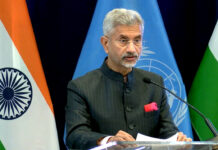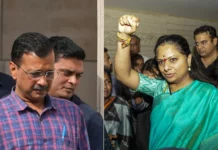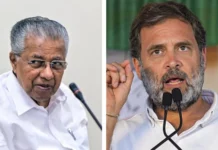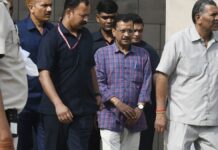NEW DELHI: Delhi Chief Minister Arvind Kejriwal on Wednesday chaired a high-level meeting with Water Resources Minister Saurabh Bhardwaj, Forest Minister Gopal Rai, and other high-ranking officials of the government to ensure adequate water supply for all households in the national capital.
During the review meeting, Kejriwal underlined the importance of increasing the availability of drinking water in the Capital. More water is wasted due to supply chain disruptions than the lack of water itself, the CM said further, as he underscored the importance of fixing the supply chain to minimise wastage.
The CM instructed the department to ensure that tube wells are installed within six months of obtaining land. He stressed that all tube wells should be in working condition and all available water should be supplied to consumers.
The chief minister stressed further that every tube well should be monitored to ensure it is running smoothly. He also directed officials to rope in an agency for maintaining tube wells for five years and carry out repairs within 24 hours in the event of breakdowns.
The CM made it clear that no tube well should be left unutilised, as he instructed officials to hold engineers accountable if a tube well remains out of order for more than four days. The water extracted from tube wells will be transported to the UGRs from where it would be supplied further, he said.
He also directed officials to complete the installation of water flow meters on underground reservoirs (UGRs) to curb the wastage of water. Flow meters will also be installed on all the tappings to accurately measure the amount of water being used. The installation of reverse osmosis (RO) systems and flow meters would also help identify which tube wells are functional and which ones are not, he said.
The chief minister also brought up the challenges faced in acquiring land for sewage treatment plants (STPs), directing officials to resolve the issue expeditiously. He assigned the responsibility of coordinating with relevant departments to Bhardwaj to ensure swift resolution of land-related issues. He instructed all ministers concerned to prioritise the provision of land for STPs.
During a discussion on lakes in the city, the CM called for the need to create a standard operating procedure (SOP) to regulate water inflow and outflow from the lakes. He also expressed concern over the lack of coordination in water extraction from lakes and stressed the need for consistency in water extraction across all regions.
Kejriwal asked officials to set up RO plants alongside lakes to clean and treat the water before supplying it to households. The deadline for setting up RO plants alongside lakes was set for September 30, this year.
CM Kejriwal directed that the supply of water from all sources should be through underground reservoirs (UGRs). “This would ensure that tube well water is also utilised properly in the process. Officials have designed a reverse osmosis (RO) plant for this purpose, and the CM will be reviewing the design himself,” he said, urging officials to finalise the design soon and expedite the commissioning of the plant.
He also stressed the importance of utilising treated wastewater, asking officials to accelerate work on the new Chandrawal plant and install filter plants that can treat and recycle wastewater.
“Additionally, an ammonia removal plant is to be established in Wazirabad, which would supply water to the major localities of the city,” he said.
The CM has directed officials to prepare a comprehensive plan for the plant within a week and prioritise its implementation.
The matter of Delhi’s water bodies was also taken up in the meeting. The CM urged officials to complete the re-survey of the water bodies within a week, including those in the DDA area where sewage and dirty waters are flowing. Saying that about 250 water bodies have been found under the DDA alone, he directed officials to work with the authority to ensure that these water bodies are properly treated and their water is made available for public use.
The CM called for a plan to manage approximately 600 water bodies in Delhi while proposing increasing water availability up to 100 MGD from groundwater. He also instructed officials to inspect sites and mark suitable land for this purpose.
He also directed officials to upgrade Kondli STP and to provide water from Kondli STP to Sanjay Lake and parks. He proposed taking water from Rithala STP to Iradat Nagar and DDA’s dead lakes once the Rithala STP is ready in the next three months. Water will also be supplied to other lakes, including those in Bhalswa, and their water bodies will be recharged under the plan.
The CM has also instructed officials to prepare a separate plan for Dwarka WTP and to explore the possibility of using water from approximately 135 STPs to recharge lakes. He praised the DSTP plan for small parks and urged officials to explore its potential for use in 200 to 300 parks, where treated water can be used.
Anticipating an increased demand for water in the upcoming summer months, the CM called for an increase in water supply and for the readiness of water tankers as a backup to ensure that there are no issues.
Currently, there are 1200 water tankers in Delhi, but the CM has proposed further increasing their number to meet the growing demand for water. Officials have reported a shortage of drivers for 100 water tankers owned by the Delhi Jal Board.
The CM, in response, has asked officials to hire drivers as soon as possible to ensure that no tankers remain idle. To ensure effective monitoring of water tankers, the CM has instructed officials to install GPS trackers on all tankers.
Kejriwal scheduled the next meeting with the Delhi Jal Board on March 25 during which he will review the decisions taken in previous meetings. The CM emphasised the need for effective planning and execution to ensure that Delhi has a sufficient and reliable supply of water, especially during the summer months.
Sharing further details about the meeting, Bhardwaj said most of the water coming from Haryana through the Yamuna at present is industrial wastewater.
“Untreated water is being released directly into the Yamuna. The quantity of ammonia in this water is so high that it cannot be treated in the treatment plants of Delhi. In the meeting, the chief minister asked to take steps so that arrangements could be made to treat ammonia coming in larger quantities,” he said.
He informed that work will be done in this direction as soon as possible and within 6 months, such treatment plants will be made available which can treat ammonia in large quantities.
He said that areas with high water tables will be identified and groundwater will be extracted from there. This water will be treated and supplied to households. (ANI)
Also Read: Delhi’s City of Lakes goal becoming a reality, revived water bodies to augment DJB supplies







